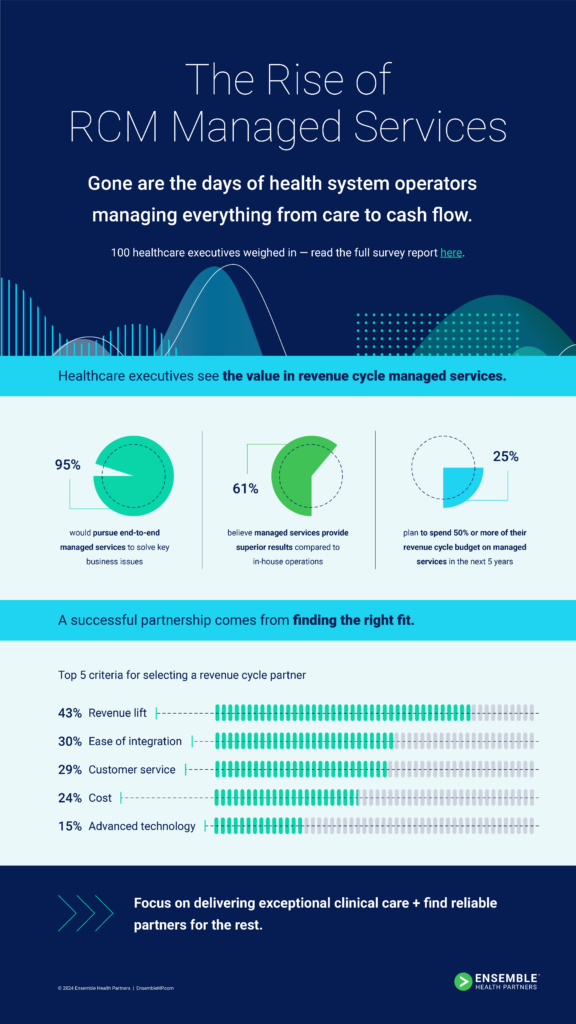What you need to know
There’s a growing trend of healthcare organizations investing in revenue cycle managed services, supported by trusted vendors. For many, in-house resourcing is no longer feasible given labor shortages, margin pressure and gaps in internal capabilities; for others, the increasing complexity of payor negotiations and decreasing payor reimbursements is fueling this shift. By partnering externally for revenue cycle management support, healthcare organizations gain efficiency, increase agility and are better able to use limited resources — all critical improvements in a difficult industry and environment.
Financial solvency is a cornerstone of sustainable healthcare operations. Much of an organization’s success or failure comes down to how the healthcare revenue cycle is managed, including activities such as identifying and recovering underpayments, negotiating with payors and ensuring proper denials management to resolve existing issues and prevent future claim denials.
As healthcare CFOs and their organizations navigate these complexities, a clear trend has emerged: the significant rise in investment directed towards revenue cycle managed services.
The shift to RCM managed services is already in motion
No longer content with or capable of keeping revenue management processes in house, many healthcare organizations are choosing instead to partner with a third-party vendor, entrusting them with this critical process.
According to a recent survey of more than 100 executives representing organizations ranging from multi-hospital systems to specialty physician groups, 97% of healthcare organizations are already spending a portion of their RCM budget on managed services. Substantial future reallocation is also on the table, with 25% of organizations planning to spend more than half of their RCM budget on managed services in the next five years.
What’s truly telling is the inclination towards and view of managed services as a viable and effective means of addressing operational challenges. An almost unanimous 95% of healthcare leaders say they would pursue end-to-end-managed services to solve key business issues — that is, one comprehensive RCM partnership, versus managing multiple vendors.

Revenue cycle managed services address in-house challenges
One primary benefit of working with a third-party partner is tackling the many challenges that weigh heavily on in-house healthcare operations, including:
- Labor shortage: 56% of healthcare leaders cited labor shortage as a primary driving force. Managing revenue cycles in-house amid staffing deficiencies becomes an uphill battle, leading organizations to seek external expertise.
- Margin pressure: The ongoing struggle to maintain margins in an increasingly complex healthcare environment also ranked high, with 49% recognizing margin pressure as a pivotal factor when choosing to work with a vendor.
- Gaps in internal capabilities: Another significant concern, flagged by 40% of respondents, revolved around missing skillsets and other gaps in internal capabilities. As the healthcare landscape becomes increasingly complex, managing every facet internally has become unwieldy for many organizations.
Other challenges cited by healthcare executives include the complexity of payor negotiations and decreasing payor reimbursements, difficulty in collecting AR, limited EHR/EMR/HIS functionality and increasing organizational complexity overall.
Looking forward with RCM managed services
The trajectory is clear: healthcare financial leaders are reimagining operational strategies by prioritizing external partnerships for revenue cycle management. This shift isn’t merely a trend but a strategic move towards efficiency, agility and optimal resource utilization.
Forging the right partnerships is pivotal. The right partnership can bring specialized expertise and other advantages that a healthcare organization simply may not have the time or resources to train in house, as providers and staff focus on patient care and other clinical concerns.
Managed services aren’t just a nice-to-have option; in today’s environment, the right partnership can be a critical component for sustainable financial health. As the healthcare landscape continues to evolve, embracing managed services emerges not only as a practical choice but as a strategic imperative for financial stability and growth.
Get the latest insights
Ensemble’s monthly newsletter keeps you ahead of the curve with unique perspectives and actionable insights about the issues at the top of your agenda.

